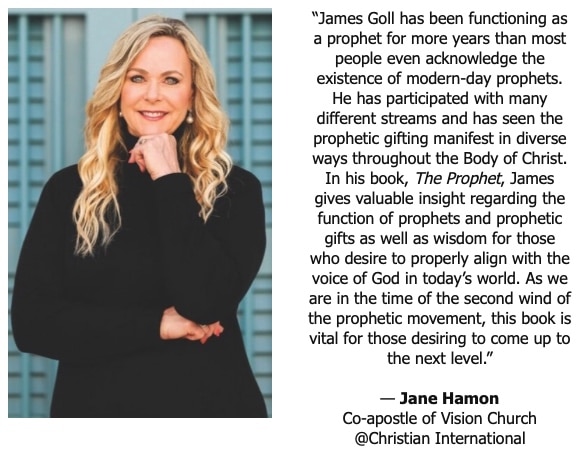Much has been said in recent weeks regarding prophecy and its accuracy in the body of Christ. My intention in this article is not to call into question any particular prophetic word given or its interpretation or application—but rather it is to give solid scriptural principles by which we can grow and mature in stewarding prophetic revelation, interpretation and application moving forward.
Years ago, when I was in Kansas City with Mike Bickle and others, Bill Hamon (a mature prophet who is the founder of an extensive ministry called Christian International) taught us about the meaning and importance of these three basic prophetic principles, which build upon each other:
- revelation
- interpretation
- application
These three principles are vital foundational building blocks in understanding the gift of prophecy.
1. Receiving Pure Revelation
How can we know if a word is genuine? It is too easy to dismiss a word as being “off ” simply because we do not consider all of the factors.
First, we must evaluate the source of the word. Let’s say that you are learning how to use your prophetic gift and a thought crosses your mind. Simply because you are a prophet, does that mean it is from God? Not necessarily. We must learn to discern the difference between three different voices that can sometimes sound almost the same: God’s Holy Spirit, our own thoughts, and satan.
John advises us to “test the spirits to see if they are from God” (1 John 4:1). How should we do that? We cannot test a word by its fruits yet, if it has not been delivered, but we can anticipate its results to some extent. Will the word express God’s love to the hearers, even as it convicts them? Or will it bring them condemnation and hopelessness? Are your own emotions and opinions part of the mix? Have you left an opening for the devil in your own life lately?
The mode of revelation is not as important as the message. If God wants to get His word across, He will use the most appropriate means to do it. “Hear now My words: if there is a prophet among you, I, the Lord, shall make Myself known to him in a vision. I shall speak with him in a dream” (Num. 12:6).
2. Proper Interpretation
Too often, genuine words from God have been judged as false because of a misconception, wrong timing, or a misinterpretation and thus a wrong application.
In his first letter, Peter made specific mention of how the earlier prophets had tried to comprehend what the Messiah would be like:
 The prophets who prophesied of the grace that would come to you made careful searches and inquiries, seeking to know what person or time [interpretation] the Spirit of Christ within them was indicating [revelation] as He predicted the sufferings of Christ and the glories to follow (1 Pet. 1:10–11).
The prophets who prophesied of the grace that would come to you made careful searches and inquiries, seeking to know what person or time [interpretation] the Spirit of Christ within them was indicating [revelation] as He predicted the sufferings of Christ and the glories to follow (1 Pet. 1:10–11).
Over time, their skewed interpretation that the Messiah would be more of a conquering King than a Suffering Servant made it difficult to recognize the true Messiah when He came. Some missed their day of visitation altogether. Proper interpretation is always important!
But we can never expect to understand spiritual matters; our human comprehension is inadequate. Rather than trying to understand everything on our own, it is vital to simply ask God for interpretation help. That is what Zechariah did. He said, “I saw at night [revelation]…then I said, ‘My Lord, what are these?’” [In other words, “what is the interpretation?”] (Zech. 1:8–9). Though Zechariah was a seer with a proven track record, he did not assume he could interpret properly. As Bob Jones used to say to us less mature prophets, “It’s the wrong time to be a know-it-all.”
Prophetic words may seem to be quite specific, and yet they have shades of meaning and intensity. The best prophetic examples are the words “soon” and “quickly.” When the Lord Jesus says repeatedly in John’s Revelation, “I am coming soon” and “Behold, I am coming quickly,” people thought he meant in the next month or year, or at least within their lifetimes. Guess what? It has not happened yet. The interpretation of those words has had to be adjusted.
People have produced whole books that are like dictionaries of Christian symbolic meanings. These can be very helpful, although they are not meant to be rigidly definitive. You learn interpretive skills by trial and error, by getting it wrong sometimes and by getting it right other times. God has a personal alphabet or language for each of us, and it is only through experience that we grow in our understanding of our own patterns of interpretation.
3. Correct Application
Having received a prophecy by some means, it is far from an automatic process to interpret its meaning and assess how to deliver it or act on it.
In the New Testament, the account about Paul and the prophet Agabus is instructive, because it demonstrates how this respected prophet (and those who witnessed the prophecy) were not equipped to go beyond the prophetic warnings to give Paul a good application. All of them thought, because the warnings were so consistent and dire-sounding, that Paul should cancel his plans to travel to Jerusalem (see Acts 21:10–14). In every church, the people loved him dearly, and they did not want to lose him (see also Acts 20:36–38). Some other disciples in Tyre had even told Paul directly not to go to Jerusalem (see Acts 21:4).
It was true that imprisonment and much personal harm awaited him. But Paul himself had heard from the Lord about this, and he had already made up his mind to go anyway, because he felt it was the will of the Lord:
See, now I go bound in the spirit to Jerusalem, not knowing the things that will happen to me there, except that the Holy Spirit testifies in every city, saying that chains and tribulations await me. But none of these things move me; nor do I count my life dear to myself, so that I may finish my race with joy, and the ministry which I received from the Lord Jesus, to testify to the gospel of the grace of God (Acts 20:22–24, nkjv).
What excellent discernment and tenacity and courage! Paul was not unmoved by their tears and pleas, for he respected their prophetic gifts and he knew that the consequences of his actions could be fatal. But when faced with the choice (the application of God’s word) he decided, My life is not my own. I am going to pay the cost and go to Jerusalem, regardless. I fully expect to get put in prison and more—which is what happened.
Appropriating God’s Word
Sometimes we do hear the Lord, but because we respond out of our minds or with a preconceived negative understanding, we reject a prophecy as invalid. We read in Hebrews: “The word they heard did not profit them, because it was not united by faith in those who heard” (Heb. 4:2).
 Other times, the hearts of the prophets or hearers are just not “good soil,” as Jesus put it in his Parable of the Sower (see Matt. 13:1–23). The parable portrays the importance of having the proper condition of heart in order to receive the implanted word of God. The same seed was sowed to all, but only some of it took root and flourished.
Other times, the hearts of the prophets or hearers are just not “good soil,” as Jesus put it in his Parable of the Sower (see Matt. 13:1–23). The parable portrays the importance of having the proper condition of heart in order to receive the implanted word of God. The same seed was sowed to all, but only some of it took root and flourished.
Can we change the condition of the soil of our hearts, making it more receptive and favorable to growth? Yes, we can. Our hearts can be watered and softened through praise and worship and forgiveness, walking in community with others.
So, we see that at least three keys are needed to unlock God’s prophetic words so that the proper actions can be taken. They are as follows:
- faith
- the right soil
- diligence in seeking
What did Daniel do when he learned from Jeremiah’s prophecy that the desolation of Jerusalem would last for seventy years? He gave himself to seeking the face of God through prayer and fasting. Such diligence in seeking is an important part of appropriating God’s promises. He was tenacious, seeking God persistently even though conditions had not yet changed, and his steadfastness was rewarded.
When we have been presented with a promise from God, our diligent seeking must often include questions about the unrevealed conditions that must be met before the word can come to pass. A conditional clause lies behind each promise, and it is not always obvious.

Heart Motivation in Prophecy
Truly God looks into the hearts of both those who receive prophecies and those who deliver them. He matches His words to the hearts, for His purposes, revealing the heart motivation in the process:
This is what the Sovereign Lord says: The people of Israel have set up idols in their hearts and fallen into sin, and then they go to a prophet asking for a message. So I, the Lord, will give them the kind of answer their great idolatry deserves. I will do this to capture the minds and hearts of all my people who have turned from me to worship their detestable idols (Ezek. 14:4–5, nlt).
God always looks deeply into our hearts. What is our real inner motivation? Do we want glory for the Lord or promotion for ourselves? Sometimes prophets can become overly concerned about their reputations, trying hard to be right. You can be wrong in having the goal of being right, you know. A heart motivation of developing a good track record is not the same as letting love be your aim (see 1 Cor. 14:1).
I heard C. Peter Wagner say, toward the end of his life: “You know, the older you get, the easier it is to confess that you’re wrong.” Most of us cling tightly to the goal of being right and find it difficult to confess our mistakes. We have to grow into letting love be our only motivation and our goal.
Discerning the Timing
 There is a kairos time, an appointed, strategically appropriate time, for events to occur. Prophets need discernment as they deliver words concerning events and developments. Almost nothing is instantaneous. Fulfillment is a process. Jesus was the fulfillment of many promises, and yet the timing of His coming was not clear until it happened: “when the fullness of the time came, God sent forth His Son” (Gal. 4:4).
There is a kairos time, an appointed, strategically appropriate time, for events to occur. Prophets need discernment as they deliver words concerning events and developments. Almost nothing is instantaneous. Fulfillment is a process. Jesus was the fulfillment of many promises, and yet the timing of His coming was not clear until it happened: “when the fullness of the time came, God sent forth His Son” (Gal. 4:4).
Often enough, so much time elapses between the prophecy and its fulfillment that we almost lose track of it. Think of Joseph’s dream about the sheaves bowing down to him (see Gen. 37:5–8) or the long centuries of waiting for the fulfillment of prophecies about the Messiah. Habakkuk’s word is a wise one: “For the vision is yet for an appointed time; but at the end it will speak, and it will not lie. Though it tarries, wait for it; because it will surely come, it will not tarry”(Hab. 2:3, nkjv).
Discernment is doubly important because of the way God speaks in parables and symbols. The Holy Spirit may speak very clearly, only to have the fulfillment surprise everyone. Here again, consider the many prophecies about the Messiah, which were almost always understood as predicting a victorious kingly figure with political power. And to add to the contradictions, when He did come, he arrived in the form of a baby.
Growing into Fruitful Prophetic Maturity
The Lord’s ways are not our ways and His thoughts are not our thoughts. His ways are far above ours, and He knows the end from the beginning, unlike us. Without stifling the Holy Spirit and being over-cautious, we must nevertheless not swing the other way into ungoverned license. We must learn to hold His words loosely enough to weigh them against all of these disparate factors, trusting that He will fulfill them and keep us on track with Him.
A prophet is not prophetic every time he opens his mouth; he may be “off duty” and that may make him seem to be neglecting the unresolved words that are still circulating.
This gives all the more reason to create an atmosphere of faith and expectation so the Holy Spirit can move freely in His own timing, speaking however He decides to do.
Let’s Pray
Gracious heavenly Father, we thank You for making known to us not only Your words but also Your wisdom about what to do with Your words. Our desire is to walk in pure revelation, in clearer interpretation, and in accurate application. If we are to succeed in our walk with You, we will need an abundance of Your great grace. Help us to keep our heart motivation pure so that we can discern Your timing, present Your word appropriately, and grow into fruitful prophetic maturity. We are grateful beyond words for the call You have given each one of us to present Your word to others. Help us to grow in properly stewarding prophecy. Our joy is in You and we pray in Jesus’ holy name. Amen.
Growing in Stewarding Prophecy!
James W. Goll
This article has been adapted from Chapter 5: “Building Blocks: The Anatomy of a Prophetic Word” in The Prophet book by James W. Goll.
 If you want to learn how to grow in stewarding prophecy, then you’ll love the The Prophet Bundle that includes The Prophet book & The Best of The Prophet 4 MP3 Set by James W. Goll! When you buy them both together, you save 24% off the retail price! You’ll also receive 12 video bonus devotionals by James W. Goll that correspond with each chapter of the book. Order your bundle and increase your prophetic discernment today!
If you want to learn how to grow in stewarding prophecy, then you’ll love the The Prophet Bundle that includes The Prophet book & The Best of The Prophet 4 MP3 Set by James W. Goll! When you buy them both together, you save 24% off the retail price! You’ll also receive 12 video bonus devotionals by James W. Goll that correspond with each chapter of the book. Order your bundle and increase your prophetic discernment today!







Leave A Comment
You must be logged in to post a comment.